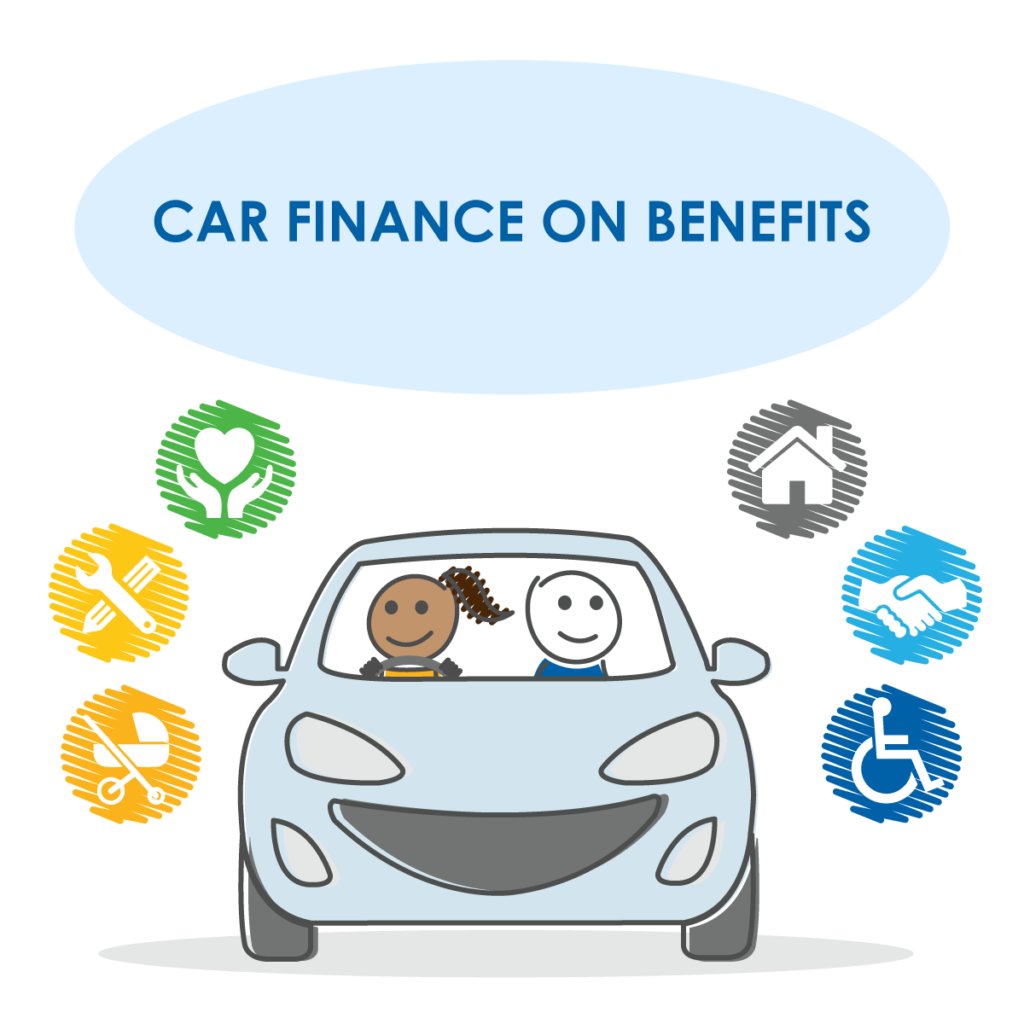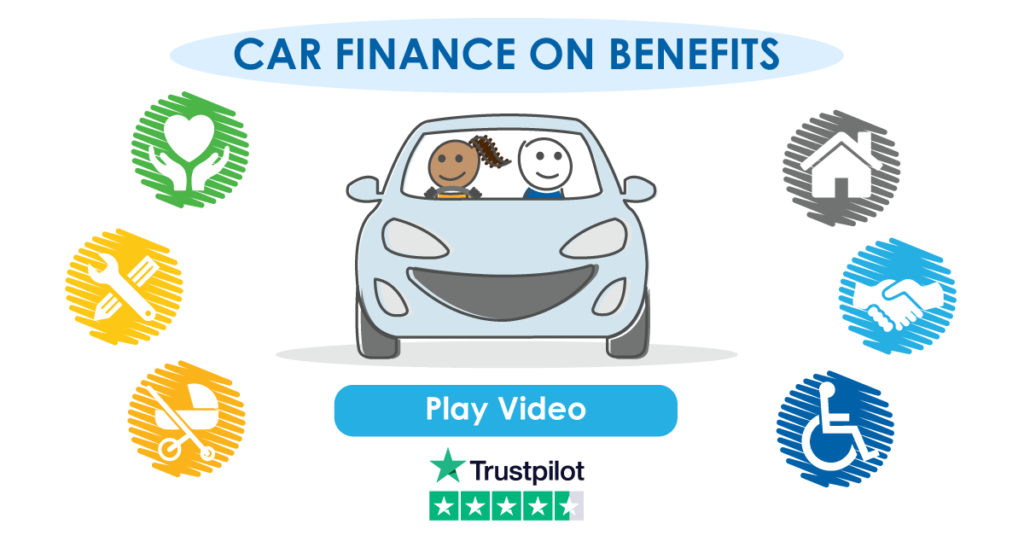Navigating the world of car finance can be challenging, especially for individuals dealing with both limited income due to benefits and a less-than-perfect credit history. In this article, I will explore the options available for car finance on benefits and bad credit, providing insights into how individuals in these circumstances can still access the mobility and freedom that comes with owning a vehicle. From specialized lenders to alternative financing arrangements, I will delve into the various avenues awaiting those seeking car finance solutions tailored to their unique financial situation.

1. What is Car Finance?
Car finance is a financial arrangement that allows individuals to purchase a car by spreading out the cost over a set period of time. It provides an alternative to paying for a car in full upfront and offers more flexibility in terms of budgeting and affordability. Car finance options typically involve taking out a loan or entering into a lease agreement with a lender or dealership. The terms of the agreement will vary depending on factors such as credit history, income, and the type of car being financed.
1.1 Types of Car Finance
There are several types of car finance options available to individuals seeking to purchase a car. These include:
-
Hire Purchase (HP): With this type of car finance, the individual agrees to make fixed monthly payments over a set period of time, usually between 1 and 5 years. Once all payments have been made, the individual becomes the legal owner of the car.
-
Personal Contract Purchase (PCP): PCP is similar to hire purchase but offers more flexibility at the end of the agreement. The individual has the option to either return the car, make a final balloon payment to own it outright, or use any equity in the car as a deposit towards a new car.
-
Personal Loan: This is a traditional loan obtained from a bank or financial institution. The individual receives a lump sum of money to purchase the car and then repays the loan with interest over a specified period.
-
Lease Agreement: A lease agreement allows individuals to use a car for a set period of time in exchange for monthly lease payments. At the end of the lease term, the individual returns the car to the leasing company.
2. Car Finance Options for People on Benefits
2.1 Benefits of Car Finance for People on Benefits
Car finance can be a viable option for individuals on benefits who need a car but may not have the funds to purchase one outright. Here are some benefits of car finance for people on benefits:
-
Affordability: Car finance allows individuals to spread the cost of a car over a longer period, making it more affordable month-to-month.
-
Access to a vehicle: Having a car can significantly improve the quality of life for people on benefits. It provides greater independence and makes it easier to access employment, healthcare, and other essential services.
-
Credit building opportunity: Timely payments towards a car finance agreement can help individuals build or improve their credit score, which can be beneficial for future financial endeavors.
2.2 Car Finance Programs for People on Benefits
There are specific car finance programs designed to cater to individuals on benefits. These programs take into account the unique financial circumstances of these individuals and offer more lenient eligibility criteria. Some car finance programs available for people on benefits include:
-
Motability Scheme: The Motability Scheme allows people on certain disability benefits to exchange their benefit payments for a lease on a brand new car.
-
Social Lending Platforms: Some online platforms specialize in providing car finance options for people on benefits. These platforms connect borrowers with lenders who are willing to offer financing based on individual circumstances.
-
Specialist Lenders: There are lenders who specifically work with individuals on benefits and understand their financial needs. These lenders may be more likely to approve car finance applications from individuals on benefits.

3. Car Finance Options for People with Bad Credit
3.1 Challenges of Getting Car Finance with Bad Credit
Having bad credit can make it more challenging to obtain car finance. Lenders typically consider credit history as a measure of an individual’s financial responsibility and ability to repay a loan. Some challenges individuals with bad credit may face when seeking car finance include:
-
Limited Lender Options: Many traditional lenders may be hesitant to provide financing to individuals with bad credit, leaving borrowers with limited options.
-
Higher Interest Rates: Bad credit borrowers may be offered higher interest rates compared to those with good credit. This is because lenders consider bad credit borrowers as higher risk.
-
Stricter Eligibility Criteria: Lenders may have stricter eligibility criteria for bad credit borrowers, requiring higher down payments or additional collateral.
3.2 Subprime Car Finance Options
Subprime car finance options are designed specifically for individuals with bad credit. These lenders specialize in working with borrowers who have had financial difficulties in the past. Subprime car finance options may include:
-
Buy Here Pay Here Dealerships: These dealerships not only sell cars but also offer in-house financing to customers with bad credit. The dealership acts as both the car seller and lender.
-
Non-traditional Lenders: Some online lenders or lending platforms cater to individuals with bad credit. These lenders are often more willing to work with individuals with lower credit scores.
3.3 Bad Credit Car Loan Programs
Certain lenders offer car loan programs specifically tailored for individuals with bad credit. These programs may take into account factors beyond the credit score, such as income and employment stability. Some features of bad credit car loan programs include:
-
Down Payment Assistance: Lenders may offer assistance in the form of lower down payments, allowing individuals with bad credit to secure car finance with less upfront cash.
-
Credit Rebuilding Opportunities: Some bad credit car loan programs provide the opportunity for borrowers to rebuild their credit through consistent, on-time car loan payments.
-
Flexible Terms: These loan programs may offer more flexible terms, allowing borrowers to choose a repayment schedule that fits their financial situation.
4. How to Improve Chances of Approval for Car Finance
Getting approved for car finance can be easier when certain steps are taken to improve one’s chances. Here are some strategies to increase the likelihood of car finance approval:
4.1 Check and Improve Credit Score
Before applying for car finance, it is essential to check your credit score and address any inaccuracies. Paying bills on time, reducing existing debts, and resolving any outstanding issues can help improve your credit score over time.
4.2 Save for a Higher Down Payment
A larger down payment can demonstrate financial stability and reduce the loan amount, making it more attractive to lenders. Saving for a higher down payment can also help lower monthly installments.
4.3 Find a Cosigner
Having a cosigner with good credit can significantly improve chances of car finance approval. A cosigner acts as a guarantor for the loan and can help mitigate the lender’s risk.
4.4 Research Different Lenders
Not all lenders have the same eligibility criteria or interest rates. Researching and comparing different lenders can help identify those that specialize in working with individuals in similar financial situations.
4.5 Show Stability and Income
Lenders often assess an individual’s stability and income as indicators of their ability to make loan payments. Providing proof of stable employment, income, and residence can help strengthen the car finance application.
4.6 Consider a Car Loan Guarantor Program
Some programs exist that connect borrowers with car loan guarantors who are willing to guarantee the loan on behalf of the borrower. These programs can increase the chances of approval for individuals with bad credit or other financial challenges.

5. Car Finance Vs. Personal Loans for Buying a Car
5.1 Differences and Similarities
Car finance and personal loans are two different ways to finance the purchase of a car. Here are some differences and similarities between the two:
-
Ownership: With car finance, the car is used as collateral, and ownership may be transferred to the individual at the end of the agreement. In contrast, a personal loan does not involve the use of collateral, and the individual owns the car outright from the start.
-
Interest Rates: Car finance options may offer lower interest rates compared to personal loans, as the car itself serves as collateral. Personal loans may have higher interest rates, as there is no specific asset securing the loan.
-
Repayment Terms: Car finance agreements typically have fixed monthly payments over a specific term, whereas personal loans often have more flexibility in terms of repayment terms.
5.2 Pros and Cons of Car Finance
Car finance has its own set of advantages and disadvantages. Here are some to consider:
Pros:
- Affordable monthly payments make it easier to budget and manage finances.
- Access to better quality and newer cars within a specified budget.
- Opportunity to build or improve credit score through regular, on-time payments.
Cons:
- The car may be subject to depreciation, which can affect its value over time.
- Limited flexibility for changes in lifestyle or vehicle needs during the finance agreement.
- Potential for additional costs such as maintenance, repairs, and insurance.
5.3 Pros and Cons of Personal Loans
Likewise, personal loans also have their own set of pros and cons. Here are some to consider:
Pros:
- Flexibility in using the loan amount for any purpose, including car purchase.
- Ownership of the car from the start, providing more control and freedom.
- Potential for negotiating lower purchase price with upfront payment.
Cons:
- Higher interest rates compared to car finance options.
- Monthly payments may be higher due to the loan amount not being spread out over a longer term.
- Credit score and income requirements may be more stringent.
6. Tips for Choosing the Right Car Finance Deal
Choosing the right car finance deal requires careful consideration and research. Here are some tips to help make an informed decision:
6.1 Set a Realistic Budget
Before considering car finance options, assess your financial situation and set a realistic budget. Consider not only the monthly payments but also other costs such as insurance, maintenance, and fuel expenses.
6.2 Compare Interest Rates and Loan Terms
Research and compare interest rates and loan terms offered by different lenders. Look for competitive rates and terms that fit your budget and financial goals.
6.3 Read the Fine Print
Carefully read and understand the terms and conditions of the car finance agreement. Pay attention to important details such as interest rates, repayment schedules, penalties for early repayment, and any additional fees or charges.
6.4 Consider Additional Costs
In addition to the monthly payments, consider other costs associated with car ownership, such as insurance, maintenance, and registration fees. Factor these costs into your overall budget to ensure affordability.
6.5 Evaluate Customer Service and Support
Good customer service and support from the lender are essential. Evaluate the lender’s reputation, responsiveness, and willingness to address any concerns or issues that may arise during the car finance agreement.
6.6 Seek Professional Advice if Needed
If you are unsure about any aspect of car finance or need assistance in choosing the right deal, consider seeking advice from a financial professional or car finance specialist. They can provide personalized guidance based on your specific circumstances.

7. How Car Finance Can Help Improve Credit Score
Car finance can be a useful tool for improving a credit score when managed responsibly. Here are some ways car finance can contribute to credit score improvement:
7.1 On-Time Payments
Making regular, on-time payments towards a car finance agreement demonstrates financial responsibility and reliability to lenders and credit bureaus. Consistently making payments according to the agreed-upon terms can have a positive impact on credit score.
7.2 Building a Positive Payment History
Car finance provides an opportunity to build a positive payment history. Timely payments and meeting all obligations under the car finance agreement showcase responsible financial behavior and can help improve creditworthiness.
7.3 Diversifying Credit Mix
Having a diverse credit mix, including both installment loans and revolving credit, is beneficial for credit scores. Car finance can help diversify credit mix if the borrower primarily has revolving credit, such as credit cards.
8. Precautions to Take When Availing Car Finance
When availing car finance, it is important to take certain precautions to protect yourself from potential scams and ensure you make an informed decision. Here are some precautions to consider:
8.1 Beware of Scams and Predatory Lenders
Be cautious of scams and predatory lenders that may take advantage of individuals seeking car finance. Research and verify the legitimacy of any lender or dealership before providing personal and financial information.
8.2 Understand the Terms and Conditions
Before signing any car finance agreement, thoroughly read and understand all terms and conditions. If something is not clear, ask for clarification, and ensure that you are comfortable with all aspects of the agreement.
8.3 Don’t Overextend Your Budget
It is crucial to stay within your budget and not overextend yourself financially when availing car finance. Consider all associated costs beyond the monthly payments to determine affordability.
8.4 Avoid Unnecessary Add-Ons
Be cautious of unnecessary add-ons and additional services that dealerships may try to include in the car finance agreement. Carefully evaluate whether these add-ons are truly necessary and worth the additional cost.
8.5 Read Online Reviews and Research the Lender
Before finalizing car finance with a specific lender or dealership, read online reviews and research the company’s reputation. This can provide insight into the experiences of other customers and help you make an informed decision.

9. Common Misconceptions About Car Finance on Benefits and Bad Credit
There are several common misconceptions surrounding car finance for individuals on benefits or with bad credit. It is important to debunk these misconceptions to clarify the options available:
9.1 Limited Options for People on Benefits
Contrary to popular belief, there are car finance options available for people on benefits. Programs such as the Motability Scheme and social lending platforms cater specifically to individuals receiving benefits, making car ownership more accessible.
9.2 High Interest Rates for Bad Credit Borrowers
While it is true that bad credit borrowers may be offered higher interest rates, this is not always the case. By shopping around, comparing rates, and working with specialized lenders, bad credit borrowers can find competitive rates and suitable financing.
9.3 Difficulty in Getting Approved with Poor Credit History
Although having a poor credit history can present challenges, there are lenders and car finance programs that are specifically designed to work with individuals in this situation. These options take into account factors beyond credit history and provide opportunities for individuals to get approved despite past financial difficulties.
10. Conclusion
Car finance provides individuals on benefits and those with bad credit with accessible options for purchasing a car. Through various programs and lenders, opportunities exist to secure car finance and improve creditworthiness. However, it is essential to carefully consider all aspects of car finance, such as interest rates, terms, and additional costs, before making a decision. Taking precautions, seeking advice when needed, and actively working to improve credit can ensure a successful car finance experience.


